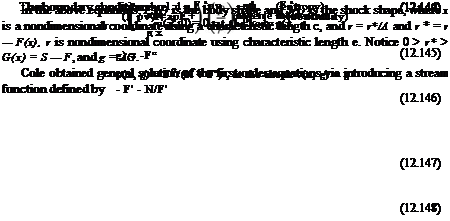Cole’s Slender Body Theory of Newtonian Flow
The Newton-Busemann formulas can be obtained systematically from an asymptotic hypersonic small disturbance theory following Cole [66], who introduced the following parameters
Y — 1
A = , (density ratio) (12.140)
Y + 1
1
H = , (hypersonic similarity parameter) (12.141)
M02-2
H y + 1 1
N = — = , (Newtonian flow parameter) (12.142)
t y — 1 M^S2
The small parameter A vanishes in the Newtonian limit y ^ 1 and
1 + A 2
Y = = 1 + 2A + 2 A2 + ••• (12.143)
1 — A
The small parameter S is the slope or maximum thickness ratio S = e/c.
For hypersonic small disturbances, the transverse perturbation velocity v is of order S, while the streamwise perturbation velocity u is of order S2. The density
perturbation is of order unity, while the perturbation in pressure is of order S2. These orders can be determined from shock wave relations or from Prandtl-Meyer expansion, provided M0S is not much less than unity.
 |
Let the Newtonian flow parameter N be fixed as A ^ 0 and H ^ 0. The first order approximate equations obtained from the hypersonic small disturbance equations for the pressure, density and the transverse velocity are (a = 0 for two dimensional flow and a = 1 for axial symmetry)
The continuity equation is satisfied automatically. The momentum equation reads
![]()
![]() 1 дф д p
1 дф д p
F" + = 0
Fa дr дr
By integration from the surface r = 0, one obtains
Fa F " ф + p = p0(x )
where ф = 0 at r = 0.

Notice that the surface pressures are independent of the Newtonian parameter N, although the flow field and shock shape depend on N (i. e. the limiting values of the surface pressures as N ^<x> should be a good approximation over a wide range of Mach numbers).
The entropy equation states that p/p — K(ф). From the shock relation K — F’2 + N on the shock, and since rfshock is given before, K (ф) can be found parametrically.
At x — 0, ф — 0 and K(0) — F/2(0) + N, so that
The surface temperature is found from the equation of state, where
![]()
 p0 — 1 + "02S’2 p — ІЇ
p0 — 1 + "02S’2 p — ІЇ
so that the surface temperature is constant
T F /2(0) K (0)
— +1 — + T0 N N
For cones, the first approximation is F (x) = x, 6 = tan вс and the shock is g(x) = Ax. The shock conditions are
p(x, Ax) = 1
p(x, Ax) = 1/(N + 1) (12.161)
v(x, Ax) = A – (N + 1)
The transverse momentum equation yields = 0, hence p = 1, 0 < r < Ax. From the entropy equation and the shock relations, it follows that the density is constant, p = 1/(N + 1).
The transverse component of the velocity can be found from the continuity equation
![]() (12.162)
(12.162)
and, using the boundary condition v = 0 at r = 0
This represents a flow filed whose streamlines are more inclined towards the cone surface as r increases.
The shock angle can be found from the boundary condition for v on the shock











